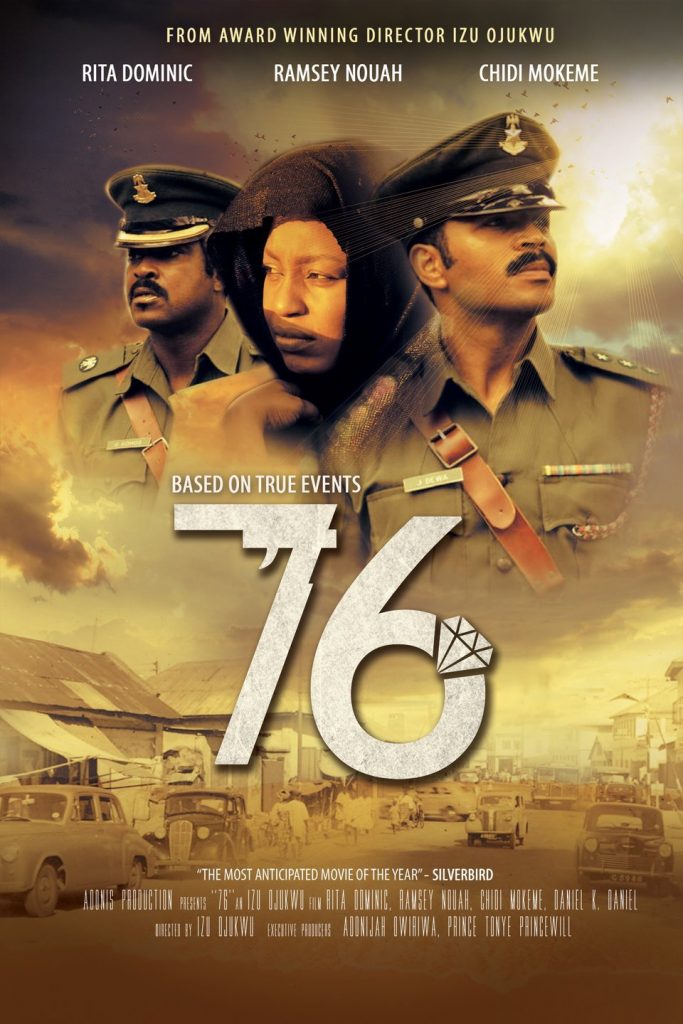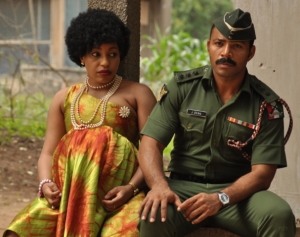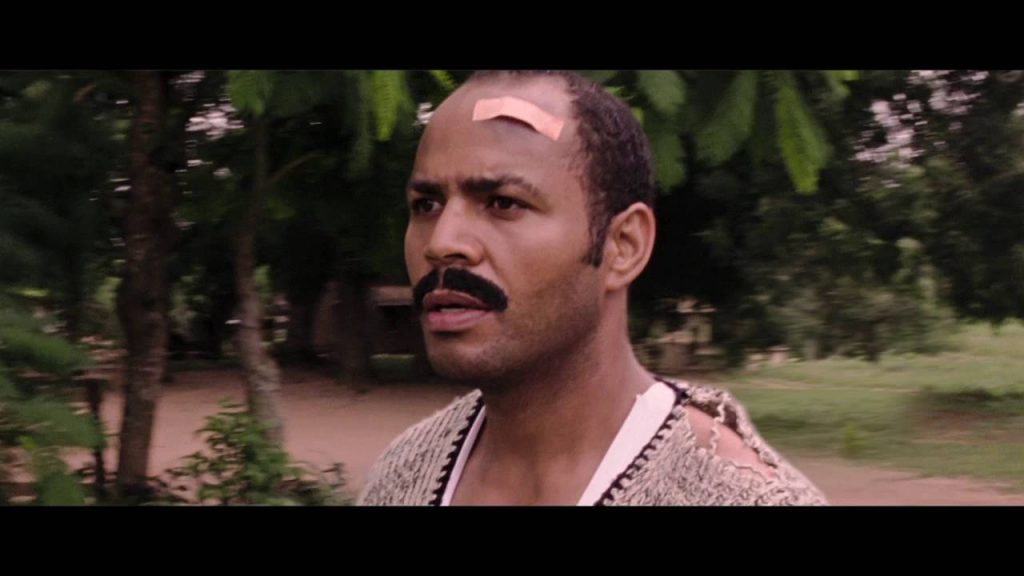By Vivian Nneka Nwajiaku
It is often said that Nigerians don’t know their history. Many argue that there is a deliberate effort by our leaders to bury history, and while there is great merit in that reasoning, there is also the fact that many Nigerians simply do not care to know. One question flowing from this would be, how does one make Nigerians care enough about their past to go read up on it? Izu Ojukwu’s period film, ’76, attempts to provide a response: make a film, preferably one that does not feel like a history class.
A seasoned filmmaker, Ojukwu has some of Nollywood’s most standout movies under his belt. His much earlier movies, White Waters and Sitanda – both of which he directed for the now-defunct Amstel Malta Box Office – were movies that dared not only to be different but to also be important, intelligent, and detail-oriented. To interpret his vision, he assembles a star-studded cast that includes Ramsey Nouah, Rita Dominic, Chidi Mokeme, Ibinabo Fiberesima, Memry Savanhu, Debo Oguns, Daniel K. Daniel, and Nelly Ekwereogo. In producing the film, he enlists the help of Adonis Productions’ Adonijah Owiriwa and Tonye Princewill of Princewill’s Trust Production Company.

’76 is at once a historical thriller and a love story, with both genres blending nicely into each other. Set in Lagos’ Dodan barracks, Joseph Dewa (Nouah), a captain in the Nigerian Army, is redeployed home suddenly after a few months of being away on his latest military posting. His wife, Suzy (Dominic), is pregnant with their first child. Before he gets a chance to properly settle back into familiar terrain, Major Gomos (Mokeme), an old friend, seeks to recruit him to participate in a military coup. Other coup plotters are suspicious, and rightly so. For a long stretch of the movie’s second act, Dewa runs, with the coup plotters on his heels, as he ventures to blow the whistle on the operation.
In the meantime, tensions at home reach boiling point. Dewa and Suzy are in conflict with Suzy’s family. They live together as husband and wife, but the required traditional rites have not been performed. This is not without a concrete reason: with the wounds of the Biafran war still fresh, Suzy’s father, a former soldier himself, worries about her marrying a soldier, especially one who is not Igbo and whose family history is not easily traceable.

As the film progresses and true to history, the head of state, General Murtala Muhammed (whose name is never expressly mentioned) is assassinated on February 13, 1976, but the coup is foiled. Implicated in this act of treason, Dewa is liable to be executed. Fresh out of the labour room, Suzy attempts to prove her husband’s innocence.
The screenplay does a magnificent job of creating not just a strong plot, but also well-developed characters with strong backstories. Per role interpretation, Nouah exhibits calculative calmness, his gait, and composure immaculate at every turn. Dominic navigates the range of her character with exceptional energy, and her on-screen chemistry with Nouah is remarkable. Mokeme brilliantly exerts his presence, imbuing his character with a personality that is as unforgettable as his stint as the host of the popular Gulder Ultimate Search. Savanhu is a delight to watch, and Owiriwa is admirable as the unrelenting but flexible investigating officer. Fiberesima’s casting almost feels like a stroke of genius, not just because of the welcome twist that her arrival reveals, but because of the attention paid to Nouah’s racial identity — an element very rarely considered in Nollywood. The deliberate casting even reflects in the extras, especially with the soldiers going about their duties. Every person who appears on-screen is involved and at least believable, if not convincing.
Attention to detail is a consistent feature throughout the movie. In terms of location, the film is extremely loyal to its setting, from the interior design that includes ancient household items (like the pot with images of “our heroes past” and that not-so-subtle rattan wig stand), to the exterior — roads, windows, doors, and vehicles. In addition, old newspaper postings and radio clips, rotary dial phones, music from Fela as well as jazz, soul, and disco singers, and the old Nigerian national anthem, are constant reminders of the time.
The movie leverages a colour palette that impressively advances the storytelling. The black and white picture of the assassination scene renders a complete historical feel. Similarly, the colour scheme used in the execution scene as Suzy struggles through the crowd to find a good view to look out for her husband evokes a picture similar to Mary looking out for her son on his road to sure death in The Passion of the Christ. Even the wardrobe choices of the characters fit their personalities near-perfectly.
For what it’s worth, ’76 is a fictional screenplay inspired by true events, so it would be unfair to judge it for not extensively detailing the events leading to the failed coup. Much like Biyi Bandele’s Half of a Yellow Sun, this film displays just what needs to be shown for the purpose of its story, without watering down the significance of the historical events it surrounds itself with. Notably, the conflict between Suzy’s family and Dewa establishes the effects of the war on family life, as well as the heightened distrust between the Igbos and other ethnic groups.
However, the movie is not without its drawbacks. The dialogue often sounds too theatrical, as if written for a foreign stage production. The editing is flawed, and some sub-plots are not properly tied up: the arrest of Ikenna (Ekwereogo) paints a picture of a greater involvement than viewers realise, but by the end of the film, it does not make much sense. He is out of mind as soon as he is out of sight, even forgotten by his sister Suzy, and reappears out of nowhere as if he is nothing more than a deliveryman. Also, it is never really clear what exactly Dewa’s offence was that led to the punishment eventually meted out to him. Furthermore, the explanation given for Dewa’s family history is nearly forceful, or at least, more dramatic than it needs to be.

Ultimately, these shortcomings take nothing away from the high quality of effort put into making ’76: a waiting period of seven months to gain pre-filming military approval, five years of production, and military training of the cast members. It is not a crash course on Nigerian history, but for years to come, it will sit comfortably as an instrumental piece in the set of Nollywood films that depict our past.
Rating: 7.5/10
(After premiering at the Toronto International Film Festival in September 2016, and later getting screened at the BFI London Film Festival, ’76 opened at Nigerian theatres in November 2016. On August 4, 2021, ’76 became available for streaming on Netflix.)
Vivian Nneka Nwajiaku, lawyer, editor and Nollywood enthusiast, writes from Lagos.




